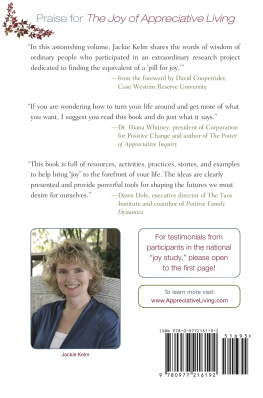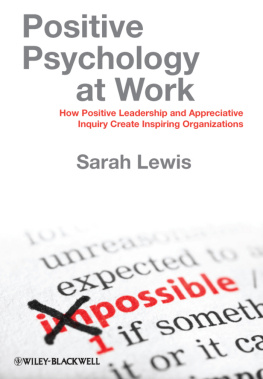Copyright 2007 by Sage Publications, Inc.
All rights reserved. No part of this book may be reproduced or utilized in any form or by any means, electronic or mechanical, including photocopying, recording, or by any information storage and retrieval system, without permission in writing from the publisher.
For information:
 | Sage Publications, Inc.
2455 Teller Road
Thousand Oaks, California 91320
E-mail: order@sagepub.com |
Sage Publications Ltd.
1 Olivers Yard
55 City Road
London EC1Y 1SP
United Kingdom |
Sage Publications India Pvt. Ltd.
B-42, Panchsheel Enclave
Post Box 4109
New Delhi 110 017 India |
Printed in the United States of America
Library of Congress Cataloging-in-Publication Data
Reed, Jan.
Appreciative inquiry: research for change / Jan Reed.
p. cm.
Includes bibliographical references and index.
ISBN 1-4129-2746-3 or 978-1-4129-2746-8 (cloth)
ISBN 1-4129-2747-1 or 978-1-4129-2747-5 (pbk.)
1. Organizational change. I. Title.
HD58.8.R3798 2007
302.35dc22
2006019604
This book is printed on acid-free paper.
06 07 08 09 10 11 9 8 7 6 5 4 3 2 1
| Acquisitions Editor: | Lisa Cuevas Shaw |
| Editorial Assistant: | Karen Greene |
| Production Editor: | Denise Santoyo |
| Copy Editor: | Carla Freeman |
| Typesetter: | C&M Digitals (P) Ltd. |
| Indexer: | Pam Van Huss |
| Cover Designer: | Candice Harman |
Foreword
T he tradition of viewing research and intervention (e.g., consultation) as separate processes, yielding wholly different sorts of information, has deep roots in academic and professional cultures. What counts as research is generally considered an important question, and it is important not only for the knowledge that research generates but also for researchers career paths. Significant research is associated with the scientific method, which connotes controlled conditions, objectivity, and pure investigation. The idea that we might, in fact, participate in social transformation by the very process of researching has long been dismissed as research that does not meet the standards of objective science.
Yet we live in a time of rapid social transformation. There are constant demands on us to make pragmatic decisions on the spot, with little time to reflect or inquire. These conditions raise questions about the resources upon which we draw in our decision making. Generally, we would like to believe that sound research informs our decisions. But often it is the pragmatic constraints and possibilities of the situated moment that guide our next move and our long-term planning. The tension between these daily professional demands and the tradition of research that is culturally valued has been a lively (and sometimes heated) topic for the past few decades. Those who have committed themselves to issues of social change have questioned the utility of taking a neutral stance toward research, which, ironically, requires working strenuously to detach themselves from the topics about which they are most passionate.
This tension has been met by great debate among researchers, particularly researchers of social interaction or those who can be identified as social scientists (psychologists, sociologists, health care professionals, economists, political scientists, and others). The most common debate is focused on the qualitative/quantitative distinction in research. Another is the distinction between basic research (that which is oriented to generating new knowledge) and applied research (that which will help people be more effective in their worlds). Within these debates, there is recognition that quantitative and basic research are more valued. They generate new knowledge, while the outcome of qualitative and applied research requires some situated grounding and therefore is only useful to the very local circumstances of the actual research site.
This volume forges a path toward dissolving these long-standing tensions. The traditional debates are brought into dialogue with each other. Rather than critique the tradition of scientific researcha familiar strategy employed to build a case for alternative research models and methodsJan Reed, herself a well-trained researcher, eloquently illustrates the ways in which Appreciative Inquiry (AI), a form of practice developed for consultation, can address the criteria expected of research. In the field of consultation, intervention and social transformation are expected outcomes. In research, understanding what the situation entails is centered. Yet many have argued that research is a form of social intervention and, in line with this view, Reed addresses how AI can transform and add to traditional research expectations. This volume does not attempt to make a case for AI as the only or best mode of research. Instead, Reed carefully shows how research, particularly in fields focused on social relationships and human interaction, can be both a means for generating new knowledge and understanding while transforming entire communities, organizations, and individuals.
AI is a form of social construction in action. Within a constructionist orientation, emphasis is placed on language practices. This means that knowledge, what we discover as researchers, has less to do with any sense of matching observations with factual evidence and has more to do with what questions we ask, how we ask them, and who is involved. Constructionists are concerned with the notion of unexamined factual evidence. Without knowing who is determining what counts as a fact and what counts as evidence, and which communitys beliefs are being privileged and which communitys beliefs are being oppressed, it is difficult to interpret the results of any research program.
As one form of constructionism in action, AI proposes that if we ask questions about problems, we create a reality of problems. On the other hand, if we ask questions about what works or what gives life to a community, group, or person, we participate in the construction of a reality of potential. Frequently misunderstood, this constructionist orientation does not imply that the problems or difficulties people might experience are not real. They are, in fact, very real insofar as we participate in forms of life that are centered on a problem orientation. The point that constructionists address, and that AI in particular illustrates, is that we have choices to make concerning what questions we ask, who we ask them of, and how we engage others.
This volume makes three major contributions. First, it introduces AI in context. As Reed notes, AI has become a popular consulting tool for organizational development (OD). Many who gravitate toward AI understand the philosophical significance and the theoretical grounding of constructionism as they engage the complex relationship between problem-solving conversations and appreciative conversations. However, for those who do not, AI has become a tool, and often it is a tool that can oppressively prohibit any talk of difficulties or problems. One has to ask, do we really want to deny any and all talk of problems? Cant there be ways to talk about our difficulties that also give rise to an appreciation of how they challenge us toward generative transformation? AI as











![Sarah Lewis [Sarah Lewis] - Positive Psychology and Change](/uploads/posts/book/124055/thumbs/sarah-lewis-sarah-lewis-positive-psychology-and.jpg)